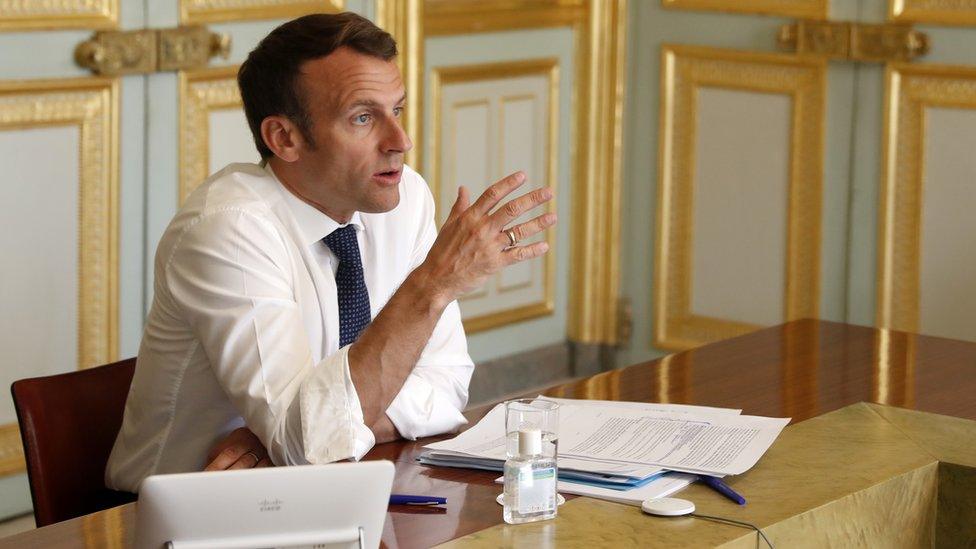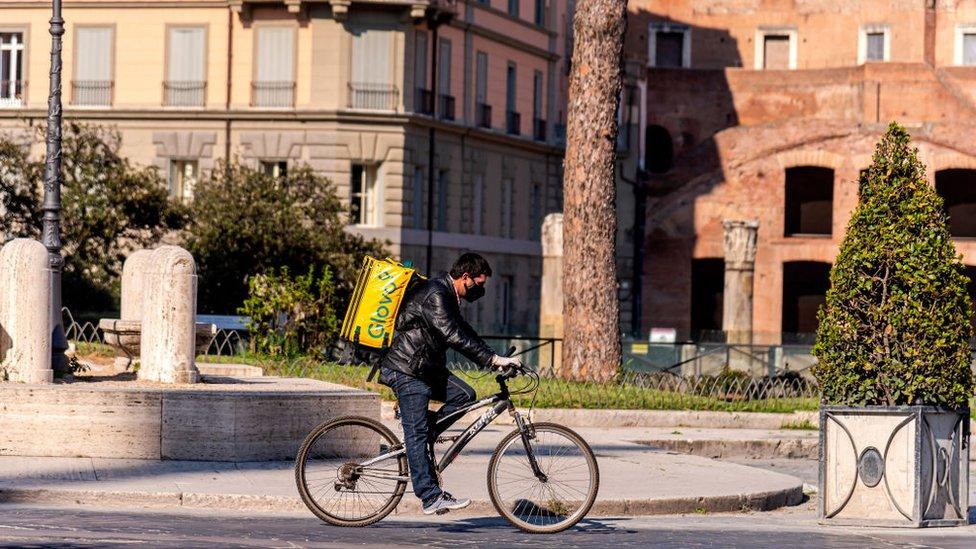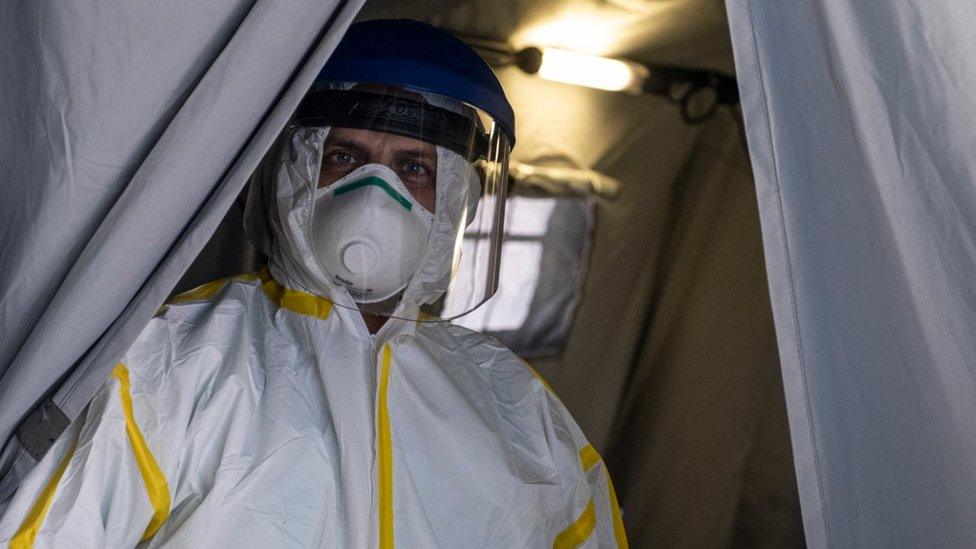Coronavirus: Macron questions China's handling of outbreak
- Published

Macron's remarks came after a row over an article by a Chinese diplomat criticising Western response to coronavirus
French President Emmanuel Macron has questioned China's handling of the coronavirus outbreak.
Mr Macron told the Financial Times it was "naive" to suggest China had dealt better with the crisis, adding things "happened that we don't know about".
More people have died in the US and several European countries than in China where the virus emerged.
The US and the UK have also cast doubt on China's figures and the speed with which it responded or alerted others.
However, the World Health Organization (WHO) has praised China's measures.
Worldwide, more than two million people have been infected and more than 145,000 have died.
The US,France, Italy and Spain are amongst the worst affected countries.
What's behind this French-Chinese confrontation?
France has seen 141,000 cases of Covid-19 and nearly 18,000 deaths. China has recorded 4,632 deaths - including an extra 1,290 deaths announced on Friday in the city of Wuhan, where the pandemic started and where a strict lockdown has only recently been lifted.
Local officials said early reporting there had been delayed and inaccurate.
President Macron's interview came after a weekend of tension which saw the summoning of the Chinese ambassador to Paris by the French foreign ministry to express disapproval over an article on the Chinese embassy's website that said Western countries had left the elderly to die in care homes.
The article - by an unnamed diplomat - was seen by France as a reference to the situation in its care homes, external, which make up a large number of deaths attributed to the disease caused by coronavirus, Covid-19.
China dismissed the row as a "misunderstanding". Government spokesman Zhao Lijian said China had never made any negative comments about how France was coping with the epidemic "and has no intention of making any".
Mr Macron was asked if China's authoritarian response to bring the outbreak under control had exposed the weakness of Western democracies, and responded that there was no comparison between open societies and those where truth was suppressed.
"Given these differences, the choices made and what China is today, which I respect, let's not be so naive as to say it's been much better at handling this," he said.

A SIMPLE GUIDE: How do I protect myself?
AVOIDING CONTACT: The rules on self-isolation and exercise
VIDEO: The 20-second hand wash

"We don't know. There are clearly things that have happened that we don't know about."
He said that abandoning freedoms to fight the pandemic would threaten Western democracies.
"We can't accept that. You can't abandon your fundamental DNA on the grounds that there is a health crisis."
What is China being accused of?
Many Western officials are coming under pressure to explain why the coronavirus outbreak is wreaking havoc on their populations - proportionally much smaller than China's.
The UK and the US have led the charge that China's figures and explanations cannot be trusted.
UK Foreign Secretary Dominic Raab told a news conference on Thursday that "hard questions" would have be asked about how the outbreak started "and how it couldn't have been stopped earlier".
He said there would have to be a "deep dive" into how the virus was able to spread from China and said it could not be "business as usual" after the crisis.
US President Donald Trump has also taken a harder line against China.
On Wednesday, asked why the US accounted for such a high proportion of the global death toll, he responded: "Does anybody really believe the numbers of some of these countries?" he said, naming China.
Donald Trump was recently asked if the virus emanated in a laboratory, rather than market
He said the US was also looking into unverified reports that the coronavirus may have emerged from a laboratory in Wuhan rather than in a market in the city.
Fox News in the US, citing unnamed sources, has suggested that the coronavirus accidentally leaked from a Wuhan facility because of lax safety protocols.
The Washington Post newspaper has reported information obtained from diplomatic cables. They show that, in 2018, US science diplomats were sent on repeated visits to a Chinese research facility. Officials sent two warnings to Washington about inadequate safety at the lab., external
US intelligence agencies have taken an interest, the Chairman of the US Joint Chiefs of Staff Gen Mark Milley said on Tuesday.
"We've had a lot of intelligence look at that. And I would just say at this point, it's inconclusive, although the weight of evidence seems to indicate natural. But we don't know for certain."
There is no evidence of any kind that the Sars-CoV-2 virus was released accidentally from a lab, says the BBC's science editor Paul Rincon.
One online theory, that went viral in January, suggested the virus could have been engineered in a lab as a bioweapon. This allegation has been repeatedly dismissed by scientists, who note that studies show the virus originated in animals, external - most likely in bats.
- Published10 April 2020

- Published8 April 2020
